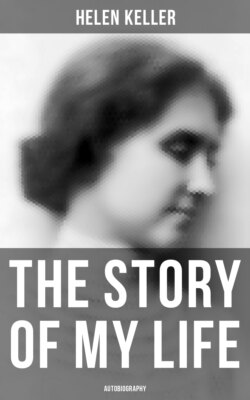Читать книгу The Story of My Life (Autobiography) - Helen Keller - Страница 7
На сайте Литреса книга снята с продажи.
CHAPTER III
ОглавлениеTable of Contents
Meanwhile the desire to express myself grew. The few signs I used became less and less adequate, and my failures to make myself understood were invariably followed by outbursts of passion. I felt as if invisible hands were holding me, and I made frantic efforts to free myself. I struggled—not that struggling helped matters, but the spirit of resistance was strong within me; I generally broke down in tears and physical exhaustion. If my mother happened to be near I crept into her arms, too miserable even to remember the cause of the tempest. After awhile the need of some means of communication became so urgent that these outbursts occurred daily, sometimes hourly.
My parents were deeply grieved and perplexed. We lived a long way from any school for the blind or the deaf, and it seemed unlikely that any one would come to such an out-of-the-way place as Tuscumbia to teach a child who was both deaf and blind. Indeed, my friends and relatives sometimes doubted whether I could be taught. My mother's only ray of hope came from Dickens's "American Notes." She had read his account of Laura Bridgman, and remembered vaguely that she was deaf and blind, yet had been educated. But she also remembered with a hopeless pang that Dr. Howe, who had discovered the way to teach the deaf and blind, had been dead many years. His methods had probably died with him; and if they had not, how was a little girl in a far-off town in Alabama to receive the benefit of them?
When I was about six years old, my father heard of an eminent oculist in Baltimore, who had been successful in many cases that had seemed hopeless. My parents at once determined to take me to Baltimore to see if anything could be done for my eyes.
The journey, which I remember well was very pleasant. I made friends with many people on the train. One lady gave me a box of shells. My father made holes in these so that I could string them, and for a long time they kept me happy and contented. The conductor, too, was kind. Often when he went his rounds I clung to his coat tails while he collected and punched the tickets. His punch, with which he let me play, was a delightful toy. Curled up in a corner of the seat I amused myself for hours making funny little holes in bits of cardboard.
My aunt made me a big doll out of towels. It was the most comical shapeless thing, this improvised doll, with no nose, mouth, ears or eyes—nothing that even the imagination of a child could convert into a face. Curiously enough, the absence of eyes struck me more than all the other defects put together. I pointed this out to everybody with provoking persistency, but no one seemed equal to the task of providing the doll with eyes. A bright idea, however, shot into my mind, and the problem was solved. I tumbled off the seat and searched under it until I found my aunt's cape, which was trimmed with large beads. I pulled two beads off and indicated to her that I wanted her to sew them on my doll. She raised my hand to her eyes in a questioning way, and I nodded energetically. The beads were sewed in the right place and I could not contain myself for joy; but immediately I lost all interest in the doll. During the whole trip I did not have one fit of temper, there were so many things to keep my mind and fingers busy.
When we arrived in Baltimore, Dr. Chisholm received us kindly: but he could do nothing. He said, however, that I could be educated, and advised my father to consult Dr. Alexander Graham Bell of Washington, who would be able to give him information about schools and teachers of deaf or blind children. Acting on the doctor's advice, we went immediately to Washington to see Dr. Bell, my father with a sad heart and many misgivings, I wholly unconscious of his anguish, finding pleasure in the excitement of moving from place to place. Child as I was, I at once felt the tenderness and sympathy which endeared Dr. Bell to so many hearts, as his wonderful achievements enlist their admiration. He held me on his knee while I examined his watch, and he made it strike for me. He understood my signs, and I knew it and loved him at once. But I did not dream that that interview would be the door through which I should pass from darkness into light, from isolation to friendship, companionship, knowledge, love.
Dr. Bell advised my father to write to Mr. Anagnos, director of the Perkins Institution in Boston, the scene of Dr. Howe's great labours for the blind, and ask him if he had a teacher competent to begin my education. This my father did at once, and in a few weeks there came a kind letter from Mr. Anagnos with the comforting assurance that a teacher had been found. This was in the summer of 1886. But Miss Sullivan did not arrive until the following March.
Thus I came up out of Egypt and stood before Sinai, and a power divine touched my spirit and gave it sight, so that I beheld many wonders. And from the sacred mountain I heard a voice which said, "Knowledge is love and light and vision."
